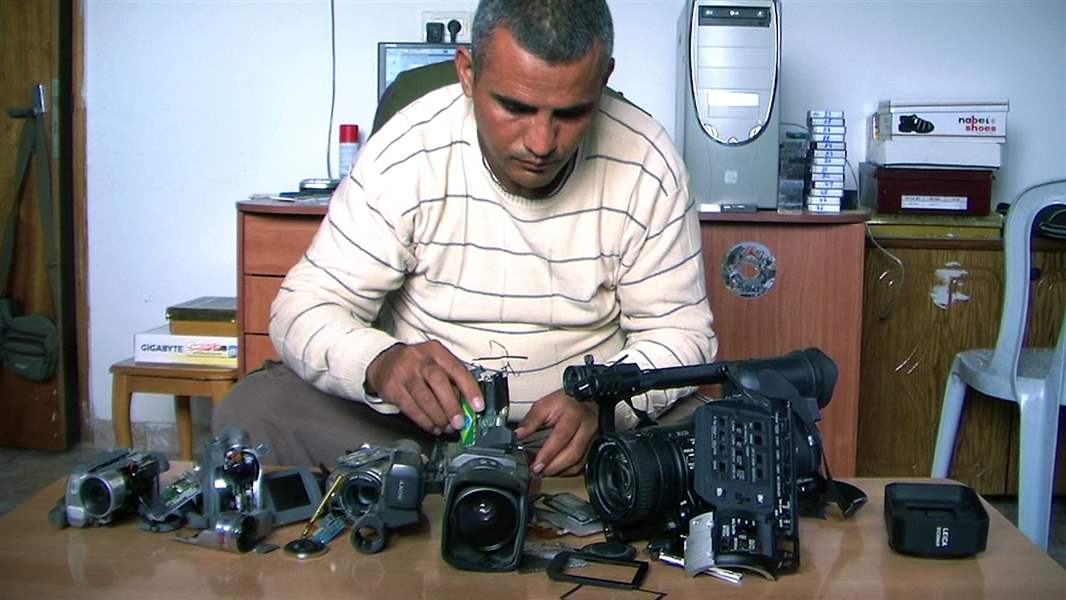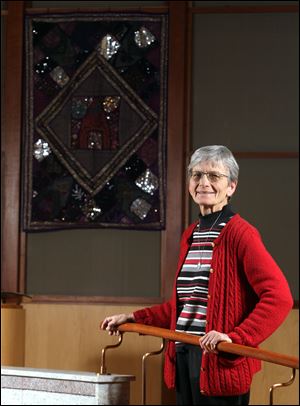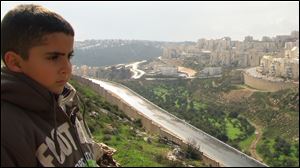
Documentary, talk look at Israeli occupation, life in West Bank
11/24/2012
Co-director Emad Burnat displays his five broken cameras, from the documentary ‘5 Broken Cameras.’
KINO LORBER, INC.

Co-director Emad Burnat displays his five broken cameras, from the documentary ‘5 Broken Cameras.’
TIFFIN — With the increased violence in Gaza and the negotiated cease-fire between Israel and Hamas in effect as of Friday, 5 Broken Cameras, a documentary that illustrates Palestinian life in the midst of the Mideast conflict, is well-timed to be presented Dec. 1 as part of an all-day event at Elizabeth Schaefer Auditorium on the St. Francis Convent campus in Tiffin.
Iyad Burnat, 39, of Bil’in in the West Bank, a leader in that Palestinian village’s nonviolent resistance to Israeli occupation, will share his experiences and will talk about the documentary, which was made by his brother, Emad Burnat, who is Palestinian, and Guy Davidi, who is Israeli.
Project Peace and Tiffin Area Pax Christi are sponsors of the workshop. Jo Hollingsworth of Fostoria, former Fostoria Mayor Jim Bailey, and Sister Paulette Schroeder of Tiffin, all of whom have visited Israel, the West Bank, and other Palestinian territories as peace activists, will speak.
“Wow! It’s very powerful,” Ms. Hollingsworth said of the film. “I had been to Bil’in. I went to Israel and Palestine with the Interfaith Peace-Builders last November.” Interfaith Peace-Builders is an organization that sends delegations from North America to Israel and the Palestinian territories “to empower delegates to educate their local communities … and advocate for a more just U.S. foreign policy,” its Web site states.
“You were right there in the conflict, if you will, between the Israelis and Palestinians,” Ms. Hollingsworth, 64, of Fostoria continues. “The presence of the occupation [by Israeli Defense Forces] was right there. You really saw it. It wasn’t subtle.”
Ms. Hollingsworth, “a Lutheran with ecumenical inclinations,” as she identifies herself, said she chose to take an interfaith trip because she didn’t want to be restricted to seeing the involvement only of her church. “I didn’t want bias. That’s why I went with Interfaith Peace-Builders.” When guides noted the good work the Lutherans were doing, however, she showed some pride.

Sr. Paulette Schroeder of the Sisters of St. Francis in Tiffin, Ohio, lived in the Palestinian territory for 3 years as a peace activist where she has founded the Peace Project.
Sister Paulette has not seen the film yet, but from August, 2008, through August, 2011, she worked in Palestinian territory as a volunteer with the Christian Peacemaker Teams organization, returning to the United States every three months to raise awareness here — and to renew her visa.
In 2011, she and her some fellow members of the Tiffin convent of the Sisters of St. Francis started Project Peace as “an outgrowth of my time in Palestine, and I promised the people there that I would try to keep lifting their voices until they are heard,” Sister Paulette said. She will deliver closing remarks after the screening and discussion.
5 Broken Cameras won the World Cinema Directing Award at the 2012 Sundance Film Festival. It shows five years of Bil’in’s existence, with Israel’s construction of a barrier through the village’s farm land to provide greater protection for nearby Israeli settlements, and the effect on Bil’in from Israeli defense activities.
The documentary also traces the growth of Emad Burnat’s fourth son, Gibreel, for Emad’s first camera was bought to record Gibreel’s birth. The title comes from the deliberate destruction of the five cameras Emad used during filming.
Ms. Hollingsworth says her involvement in the issue is one of human rights. “People have asked me,” she said, “because I am not Arab, I am Christian, so in one sense it doesn’t seem I have too much to do with [Mideast peace]. I think it’s a human-rights issue, and that is why I feel so strongly about it, but I also feel we, the American public, are not getting the full story. We get only part of the story, and when you dig, you find out there’s so much more.”
“Palestine taught me so much,” Sister Paulette added. “I was beginning to see even in terms of my faith what is true, that all the people are on the margins — and Palestinians are definitely on the margins. Coming to know these folks, and falling in love with them, to respect and be respected, has taken me to a different level of what faith is. I see God’s unconditional love so strong for every person.”
There is also a history lesson for the Franciscan nun. Sister Paulette said. “St. Francis [of Assisi] went during the Crusades and tried to get the Crusades stopped. He stayed with the Saracens for six weeks and learned so much about Islam and Middle Eastern culture. [The Arabs’] love of the land is just as strong as any of the Jews’ love of the land. They’ve been there since the seventh century in majority.”
Sister Paulette wishes that people would “recognize the brotherhood and sisterhood of everybody, and it’s incumbent on us to know each other more,” she said. “If we accept that God is a God of love and we ‘love each other as I have loved you’ [as Jesus said], how can that not include human rights? Would I want anyone to ignore me if my human rights were being ignored? If I’m powerless and tried everything I can, I need intervention.” Sister Paulette’s attempts to raise awareness are her intervention for her Palestinian friends.

Emad's son Gibreel looks over the Israeli-built wall at Israeli settlements. The scene is from the documentary to be shown at the St. Francis Convent Campus in Tiffin on Dec. 1.
For those who criticize peace-making efforts like hers, “it’s a different understanding of God and a different understanding of church, I’m sorry to say. Our understanding of church is not as a denomination,” Sister Paulette says, “but as all the people of God. They are all brothers and sisters to me, truly, as much as my own blood brothers and sisters. We are all sons and daughters of God. God doesn’t tolerate anything but love toward his people.”
Ms. Hollingsworth also refers to Jesus’ teaching. “As a peacemaker,” she says, “I feel that is following Christ’s dictate that he mentioned in the Beatitudes [to love neighbors and enemies], but that to me is very powerful and I try to adhere to it as best I can. It’s not my goal to make [those with differences] agree with me. That would be unreasonable, but I want them to have more information to think about that starts their journey.”
Sister Paulette and Ms. Hollingsworth have been paying attention to the news. “I’m so happy that they’ve gotten the cease-fire,” Ms. Hollingsworth says. “I think that’s really very good, and it’s hopefully a move in the right direction. One of the things that has happened is, not only are the Palestinians not supposed to shoot rockets into Israel and Israel won’t bombard Gaza, but I understand there’s supposed to be a lessening of the blockade on Gaza. I certainly hope that happens and it would be a step in the right direction. I sure hope it works — or maybe we should pray that it works.”
Sister Paulette said, “I’m not so hopeful yet. This has happened many times in history.”
As for the Palestinian organization Hamas, which the United States considers a terrorist organization, she said, “There’s a great misunderstanding of Hamas in the United States. Hamas does have a militant arm, they do, but their mantra is not to ‘Take Israel out.’ They’re more of a radical faction. Hamas is also the ones who keep [the Palestinians] in shelter. They’re the ones who bring their houses back after they’re attacked.”
The 5 Broken Cameras event runs from 9 a.m. to 3:30 p.m.
Contact TK Barger at: tkbarger@theblade.com or 419-724-6278.